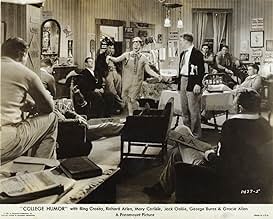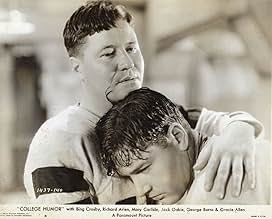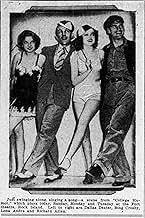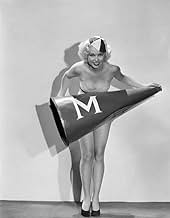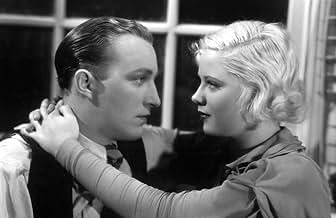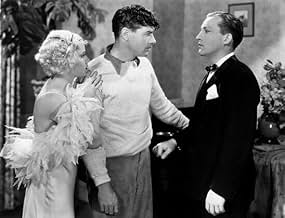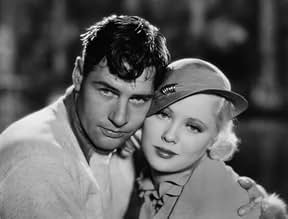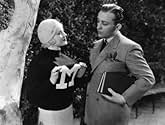Füge eine Handlung in deiner Sprache hinzuA college professor and the school's star football player are both rivals for the same beautiful coed.A college professor and the school's star football player are both rivals for the same beautiful coed.A college professor and the school's star football player are both rivals for the same beautiful coed.
- Regie
- Drehbuch
- Hauptbesetzung
George Burns
- George Burns
- (as Burns and Allen)
Gracie Allen
- Gracie Allen
- (as Burns and Allen)
Joe Sawyer
- Tex Roust
- (as Joseph Sawyer)
Edward J. Nugent
- Whistler
- (as Eddie Nugent)
Empfohlene Bewertungen
During the 1930s, films about college were very, very popular...even though most folks at the time could never dream of affording to go to college. And, most of these films are fluff...with little in the way of plot. This is DEFINITELY true with "College Humor"...a film that is so slight and plotless...even compared to films like "Horse Feathers"!
Instead of plot, this film seems to be made up of snippets. So, while I could try to explain the plot, I won't other than to say it's mostly about football. Additionally, one of the professors (Bing Crosby) spends a lot of time crooning and occasionally putting the moves on one of the co-eds. And, Burns & Allen are there...well...for no reason whatsoever.
Because there is almost no plot and a few of the characters complete jerks (Richard Arlen and Joe Sawyer's are both good examples), it's a film I am loathe to recommend. It's not awful...it just seems more slight, more silly and more of a time-passer than usual for this ever so slight genre.
By the way, like so many of these college films, most of the students are well into their 30s!
Instead of plot, this film seems to be made up of snippets. So, while I could try to explain the plot, I won't other than to say it's mostly about football. Additionally, one of the professors (Bing Crosby) spends a lot of time crooning and occasionally putting the moves on one of the co-eds. And, Burns & Allen are there...well...for no reason whatsoever.
Because there is almost no plot and a few of the characters complete jerks (Richard Arlen and Joe Sawyer's are both good examples), it's a film I am loathe to recommend. It's not awful...it just seems more slight, more silly and more of a time-passer than usual for this ever so slight genre.
By the way, like so many of these college films, most of the students are well into their 30s!
If you can believe Jack Oakie, Richard Arlen and Joe Sawyer (billed as Joseph Sauer) as college kids then what a vivid imagination you have!!!! Joe Sawyer looked in training for his tough guy roles and Arlen looked as though he'd be more at home on skid row than a college campus. At least Jack Oakie was still in his "trim" period but all of them looked older than they actually were (I thought). I know Jack Oakie was in a couple of college films - "Touchdown" and "Sweetie" where he played a vaudeville hoofer who followed Nancy Carroll to college - but I don't know whether he actually played many "college kids". Eddie Nugent, surprisingly, had a "blink and you'll miss him" part as Whistler.
At least the girls were pretty and youthful, including a very cute Mary Kornman who played Amber. She had been leading lady in the original series of "Our Gang" and then the spin-off series from the early 30s "The Boyfriends". She had also co-starred with Bing Crosby in a couple of his shorts.
Bing Crosby (looking young and beautiful) plays the drama and music professor, Fred Danvers. The film doesn't really hold up that well and could have done with more of Bing and his singing. "Down the Old Ox Road" could have been done more like "Flirtation Walk". It is such a catchy song when Bing sings it but before that Richard Arlen has a go - and he can't sing!!!. Then Jack Oakie and Mary Kornman walk and sing - it is very disjointed. "Learn to Croon" again is a very catchy song that Bing sings to his students - "if you're looking for a sunny honeymoon, learn to croon!!". He also sings a few bars of some of his big hits - "Please", "Just an Echo in the Valley", "I Surrender Dear"
This was Mary's first film with Bing and she was beautiful and compli- mented him very well. She plays Barbara Shirrel, Barney's (Jack Oakie) sister, who is supposed to be Mondrake's (Richard Arlen) girl but has secretly fallen for Mr. Danvers. Arlen's character is not appealing - he is grumpy, a heavy drinker and just does not look like a college type. Another reviewer questioned Joe Sawyer's character leaving college - then turning up a year later with a wife and 2 kids!!!! - I think it was just the shoddy story line. In the scene where Mondrake goes with Barney to meet his date Barbara, Ginger comes down the stairs and they go out!!
Lona Andre was given a picture credit but she was completely under-used
6 out of 10.
At least the girls were pretty and youthful, including a very cute Mary Kornman who played Amber. She had been leading lady in the original series of "Our Gang" and then the spin-off series from the early 30s "The Boyfriends". She had also co-starred with Bing Crosby in a couple of his shorts.
Bing Crosby (looking young and beautiful) plays the drama and music professor, Fred Danvers. The film doesn't really hold up that well and could have done with more of Bing and his singing. "Down the Old Ox Road" could have been done more like "Flirtation Walk". It is such a catchy song when Bing sings it but before that Richard Arlen has a go - and he can't sing!!!. Then Jack Oakie and Mary Kornman walk and sing - it is very disjointed. "Learn to Croon" again is a very catchy song that Bing sings to his students - "if you're looking for a sunny honeymoon, learn to croon!!". He also sings a few bars of some of his big hits - "Please", "Just an Echo in the Valley", "I Surrender Dear"
- as if audiences needed reminding that he was Bing Crosby!!! He also sang it again at a party. "Moonstruck" was a love song sung to Mary Carlisle, with Bing at the piano.
This was Mary's first film with Bing and she was beautiful and compli- mented him very well. She plays Barbara Shirrel, Barney's (Jack Oakie) sister, who is supposed to be Mondrake's (Richard Arlen) girl but has secretly fallen for Mr. Danvers. Arlen's character is not appealing - he is grumpy, a heavy drinker and just does not look like a college type. Another reviewer questioned Joe Sawyer's character leaving college - then turning up a year later with a wife and 2 kids!!!! - I think it was just the shoddy story line. In the scene where Mondrake goes with Barney to meet his date Barbara, Ginger comes down the stairs and they go out!!
Lona Andre was given a picture credit but she was completely under-used
- she had about 2 lines in the film. Likewise George Burns and Gracie Allen only had a scene - they looked like they were included as an after thought!!!!
6 out of 10.
College Humor is the perfect title for a silly, youth-oriented romantic comedy about a college football star whose girlfriend has fallen in love with a professor. Trust me, it sounds much more serious than it is.
The funniest part of the movie in my opinion was the production number that shows all the coeds coupling up and finding corners to "neck" on date night. Jack Oakie chases after his girl, Mary Kornman, repeatedly nodding his head, hoping to get a nod in return, but only getting a shake when she decides she's not in the mood. At the end of the song and dance, they wind up outside the professor housing. Bing Crosby stands by his open window and croons, unknowingly making Mary fall for him. Then, resigned to his fate, Jack looks at Mary and shakes his head. To his surprise, Mary grins and nods her head-it's go time! Sure, it's a little weird, but it's a little funny at the same time.
Much of this movie is dated for the simple reason that college coeds nowadays have different problems than winning a football game. College movies, and college life for that matter, are very raunchy, so the intended audience will be incredibly bored watching this one.
The funniest part of the movie in my opinion was the production number that shows all the coeds coupling up and finding corners to "neck" on date night. Jack Oakie chases after his girl, Mary Kornman, repeatedly nodding his head, hoping to get a nod in return, but only getting a shake when she decides she's not in the mood. At the end of the song and dance, they wind up outside the professor housing. Bing Crosby stands by his open window and croons, unknowingly making Mary fall for him. Then, resigned to his fate, Jack looks at Mary and shakes his head. To his surprise, Mary grins and nods her head-it's go time! Sure, it's a little weird, but it's a little funny at the same time.
Much of this movie is dated for the simple reason that college coeds nowadays have different problems than winning a football game. College movies, and college life for that matter, are very raunchy, so the intended audience will be incredibly bored watching this one.
"College Humor" took place on the college campus of Midwest University where Professor Danvers (Bing Crosby) spent more time crooning than teaching. I know that the movie was just a platform to showcase Bing Crosby's singing and George Burns and Gracie Allen's comedy.
Barney Shirrel (Jack Oakie) was a new student and a new pledge to Delta Alpha fraternity. If you didn't like fraternities to start, "College Humor" won't help any. Barney's senior frat bros were Mondrake (Richard Arlen) and Tex Roust (Joe Sawyer). They were unnecessarily cruel, but I suppose it was all an expected part of frat culture.
This movie, along with not being funny, was in poor taste. One of the coeds, Barbara Shirrell (Mary Carlisle), Barney's sister, openly kissed Mr. Danvers (Bing Crosby) on the mouth in class. The appropriate response would have been to chastise her right away, but Professor Danvers clearly enjoyed it and made himself the third leg of a love triangle.
It was hard to tell if it was a triangle or not. In a normal triangle there is one person who is the object of the love of two others. In this case, Barbara loved Danvers, but it wasn't clear that he loved her. Mondrake loved Barbara, but she didn't quite love him. It was a mess.
Barbara didn't help matters any. She openly flirted with Danvers while being arm and arm with Mondrake. It was a whorish scene that took moxy and shamelessness.
Besides the Barbara mess, the fraternity hazing was a bit too serious. They did hazing in "Animal House," but they made it funny and it wasn't too violent. In "College Humor" the hazing was more serious and definitely too violent.
"College Humor" made college look like a detestable place to be. Frat boys were abusing pledges, pretty girls were romantically involved with their teachers, all the school pride was based on the football team, and jocks were expected to be treated special. "College Humor" was not a good showcase of what a healthy college looks like.
Free on YouTube.
Barney Shirrel (Jack Oakie) was a new student and a new pledge to Delta Alpha fraternity. If you didn't like fraternities to start, "College Humor" won't help any. Barney's senior frat bros were Mondrake (Richard Arlen) and Tex Roust (Joe Sawyer). They were unnecessarily cruel, but I suppose it was all an expected part of frat culture.
This movie, along with not being funny, was in poor taste. One of the coeds, Barbara Shirrell (Mary Carlisle), Barney's sister, openly kissed Mr. Danvers (Bing Crosby) on the mouth in class. The appropriate response would have been to chastise her right away, but Professor Danvers clearly enjoyed it and made himself the third leg of a love triangle.
It was hard to tell if it was a triangle or not. In a normal triangle there is one person who is the object of the love of two others. In this case, Barbara loved Danvers, but it wasn't clear that he loved her. Mondrake loved Barbara, but she didn't quite love him. It was a mess.
Barbara didn't help matters any. She openly flirted with Danvers while being arm and arm with Mondrake. It was a whorish scene that took moxy and shamelessness.
Besides the Barbara mess, the fraternity hazing was a bit too serious. They did hazing in "Animal House," but they made it funny and it wasn't too violent. In "College Humor" the hazing was more serious and definitely too violent.
"College Humor" made college look like a detestable place to be. Frat boys were abusing pledges, pretty girls were romantically involved with their teachers, all the school pride was based on the football team, and jocks were expected to be treated special. "College Humor" was not a good showcase of what a healthy college looks like.
Free on YouTube.
COLLEGE HUMOR (Paramount, 1933), directed by Wesley Ruggles, is one of many college campus musicals made during the Depression 1930s, highlighted with music and a football game finale.
Following his success in THE BIG BROADCAST (1932), Bing Crosby shows promise in his initial top-billed feature role, which is actually a second lead part as Frederick Danvers, a professor at Midwest University. In support are some over-aged college students, including Richard Arlen as Ralph, a football star whose career declines due to drunken disorderly conduct and jealous rages; Jack Oakie, the real star of the movie, as his football playing pal, Barney; Joseph Sawyer (billed Sauers) as a tough named "Tex", who excels in beating up on Oakie in one scene during a college initiation; with blonde and perky Mary Carlisle as Arlen's girlfriend who has a crush on her crooning professor; and Mary Kornman as Oakie's girlfriend, Amber. With the trials and tribulations amongst the students, the lighter moments go to the comedy team of George Burns and Gracie Allen, appearing in a few scenes as college caterers. They even take a moment out to sing an Irish song, "Colleen of Korlarny." Gracie manages to sing well, even in character. With music and lyrics by Arthur Johnson and Sam Coslow, the catchy tunes include "Play Ball" (sung by off screen singers during opening credits/re-prised in opening story by Crosby); "The Old Ox-Road" (sung by Jack Oakie/ students/ Crosby); "Learn to Croon" (sung by Crosby/ students); "Moon Struck" (sung by Crosby as he plays piano); along with reprises of "Learn to Croon" and "Play Ball" before the closing cast credits.
What makes COLLEGE HUMOR interesting in itself is seeing a young Crosby in an offbeat yet small role, while Jack Oakie was actually the central character. Crosby would return to college again in later years, most notably as a student in the then popular SHE LOVES ME NOT (1934). Unseen regularly since broadcast on public television in the 1980s, it had its very rare cable television showing on Turner Classic Movies (TCM premiere: November 15, 2018).
*Warning: The 2005 video cassette copy distributed by Hollywood's Attic is not complete. Eliminated from the original 80 minute print are the introduction of leading players during the opening credits to the underscoring of "Learn to Croon" followed by Bing Crosby's opening number of "Play Ball." with James Burke, James Donlan and James Conlin (**1/2 Footballs)
Following his success in THE BIG BROADCAST (1932), Bing Crosby shows promise in his initial top-billed feature role, which is actually a second lead part as Frederick Danvers, a professor at Midwest University. In support are some over-aged college students, including Richard Arlen as Ralph, a football star whose career declines due to drunken disorderly conduct and jealous rages; Jack Oakie, the real star of the movie, as his football playing pal, Barney; Joseph Sawyer (billed Sauers) as a tough named "Tex", who excels in beating up on Oakie in one scene during a college initiation; with blonde and perky Mary Carlisle as Arlen's girlfriend who has a crush on her crooning professor; and Mary Kornman as Oakie's girlfriend, Amber. With the trials and tribulations amongst the students, the lighter moments go to the comedy team of George Burns and Gracie Allen, appearing in a few scenes as college caterers. They even take a moment out to sing an Irish song, "Colleen of Korlarny." Gracie manages to sing well, even in character. With music and lyrics by Arthur Johnson and Sam Coslow, the catchy tunes include "Play Ball" (sung by off screen singers during opening credits/re-prised in opening story by Crosby); "The Old Ox-Road" (sung by Jack Oakie/ students/ Crosby); "Learn to Croon" (sung by Crosby/ students); "Moon Struck" (sung by Crosby as he plays piano); along with reprises of "Learn to Croon" and "Play Ball" before the closing cast credits.
What makes COLLEGE HUMOR interesting in itself is seeing a young Crosby in an offbeat yet small role, while Jack Oakie was actually the central character. Crosby would return to college again in later years, most notably as a student in the then popular SHE LOVES ME NOT (1934). Unseen regularly since broadcast on public television in the 1980s, it had its very rare cable television showing on Turner Classic Movies (TCM premiere: November 15, 2018).
*Warning: The 2005 video cassette copy distributed by Hollywood's Attic is not complete. Eliminated from the original 80 minute print are the introduction of leading players during the opening credits to the underscoring of "Learn to Croon" followed by Bing Crosby's opening number of "Play Ball." with James Burke, James Donlan and James Conlin (**1/2 Footballs)
Wusstest du schon
- WissenswertesWhen it premiered in New York City on June 22, 1933, the running time was one hour and eight minutes, and reviewers complained about the "choppy" editing. As a result, missing sequences were restored, and the running time was extended to one hour and twenty minutes, which is the version presently available on DVD.
- PatzerBing Crosby tells his class that they will look at great love scenes in drama "from Ophelia to Cordelia." Cordelia, the king's daughter in King Lear, does not have any love scenes.
- SoundtracksDown the Old Ox Road
Music by Arthur Johnston
Lyrics by Sam Coslow
Sung by Bing Crosby, Jack Oakie, Mary Kornman and chorus
Top-Auswahl
Melde dich zum Bewerten an und greife auf die Watchlist für personalisierte Empfehlungen zu.
Details
- Erscheinungsdatum
- Herkunftsland
- Sprache
- Auch bekannt als
- Alegria estudiantil
- Drehorte
- Produktionsfirma
- Weitere beteiligte Unternehmen bei IMDbPro anzeigen
- Laufzeit1 Stunde 20 Minuten
- Farbe
- Seitenverhältnis
- 1.37 : 1
Zu dieser Seite beitragen
Bearbeitung vorschlagen oder fehlenden Inhalt hinzufügen


